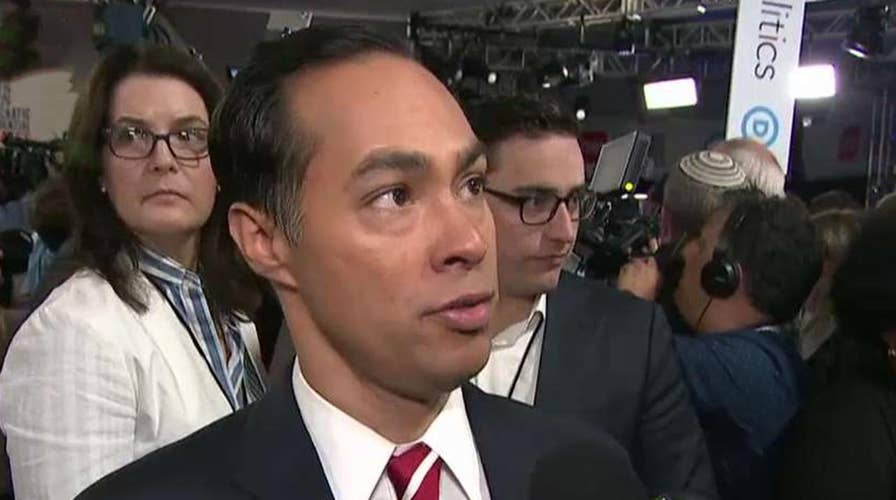Castro: I've learned the lessons of the past on immigration, Biden has not
Fox News correspondent Peter Doocy speaks with 2020 candidate Julian Castro following the Democratic presidential debate.
As a naturalized United States citizen and advocate for immigration reform, I should be thrilled that immigration is a hot-button issue in the 2020 election. It dominates media coverage, and almost every week, there's a protest over the issue.
All Democratic presidential hopefuls have spoken passionately about their support for open immigration. Several candidates, including Sen. Elizabeth Warren, D-Mass., and Sen Bernie Sanders, I-Vt., have said they want to decriminalize illegal border crossings.
Yet, all the talk, news coverage, and protests have only brought legal immigrants — including me — disappointment and frustration. When was the last time the left mentioned legal immigration and legal immigrants?
Based on the way the left talks about immigration, one could easily get the impression that most immigrants came to the United States illegally; that only illegal immigrants matter; or that any discussion of illegal immigration is a racist attack on Latinos. None of this is true.
According to the Pew Research Center, a total 44.4 million immigrants lived in the U.S. in 2017. A majority (77 percent) came to the U.S. legally. And in 2017, the U.S. accepted close to a million legal immigrants. The top four countries of origin that year were India, Mexico, China and Cuba.
CLICK HERE TO SIGN UP FOR OUR OPINION NEWSLETTER
More from Opinion
With so many legal immigrants coming from Latin America, it's demeaning for the left to suggest that all Latinos are illegal immigrants. What the left doesn't want to admit is that President Trump has a strong approval rating among Hispanics because many of them do support border security.
Here are more facts that the left doesn't want to admit. Many legal immigrants have faced challenges similar to those that illegal immigrants face, such as separation from their families. But for some legal immigrants, the separation they have to endure is measured not by days, but by years.
The latest visa bulletin, which summarizes immigration numbers and expected wait times, shows that siblings of U.S. citizens can expect to wait 13 years before immigrating to America. That includes 15 years for those from India and 21 years for those from the Philippines. Unmarried adult children can anticipate waiting five years (11 years for those from the Philippines and 21 years for those from Mexico).
The wait for those seeking employment-based visas is only slightly better. A prospective immigrant from India with an "advanced degree or exceptional ability" must wait 11 years before joining the U.S. economy.
In fact, more than 2.3 million legal immigration applications are stuck in our present backlog. The long wait sometimes forces legal immigrants to repeat the same steps and complete the same forms more than once.
For example, almost all legal immigration applicants are required to go through a medical exam, which typically costs several hundred dollars. The exam result is only valid for one year. If there is no progress in the immigration process within a year, the applicant must spend another couple hundred dollars to redo their medical exam and provide new results in order to make their medical record is up to date.
America's immigration laws are some of the most complex laws on the books. Most applicants cannot navigate the complex process without hiring legal counsel. The long wait and the complexity of the law mean that complying with it is a costly endeavor for many legal immigrants.
Not all costs can be quantified by dollars, such as the emotional toll applicants endure due to the uncertainty of the process. During the seemingly endless wait, many legal immigrants are afraid to travel abroad, afraid to change jobs, and afraid to buy a home, because they are uncertain if they can legally stay or not.
CLICK HERE TO GET THE OPINION NEWSLETTER
For applicants residing outside the United States, some postpone marriage or delay having kids, worrying that such a life-changing event may increase the probability of having their applications denied.
Beyond these challenges, the Personal Responsibility and Work Opportunity Reconciliation Act of 1996 (PRWORA) signed by President Clinton effectively barred legal immigrants (with a few exceptions for refugees and veterans) from accessing federal welfare benefits for the first five years after their legal entry.
CLICK HERE TO GET THE FOX NEWS APP
That has not prevented almost all Democratic 2020 presidential hopefuls from supporting the notion of free health care for illegal immigrants.
The question we should ask, then, is if a Democrat wins the 2020 presidential election and prioritizes illegal immigrants over legal immigrants, why should anyone be motivated to participate in the legal process at all?

